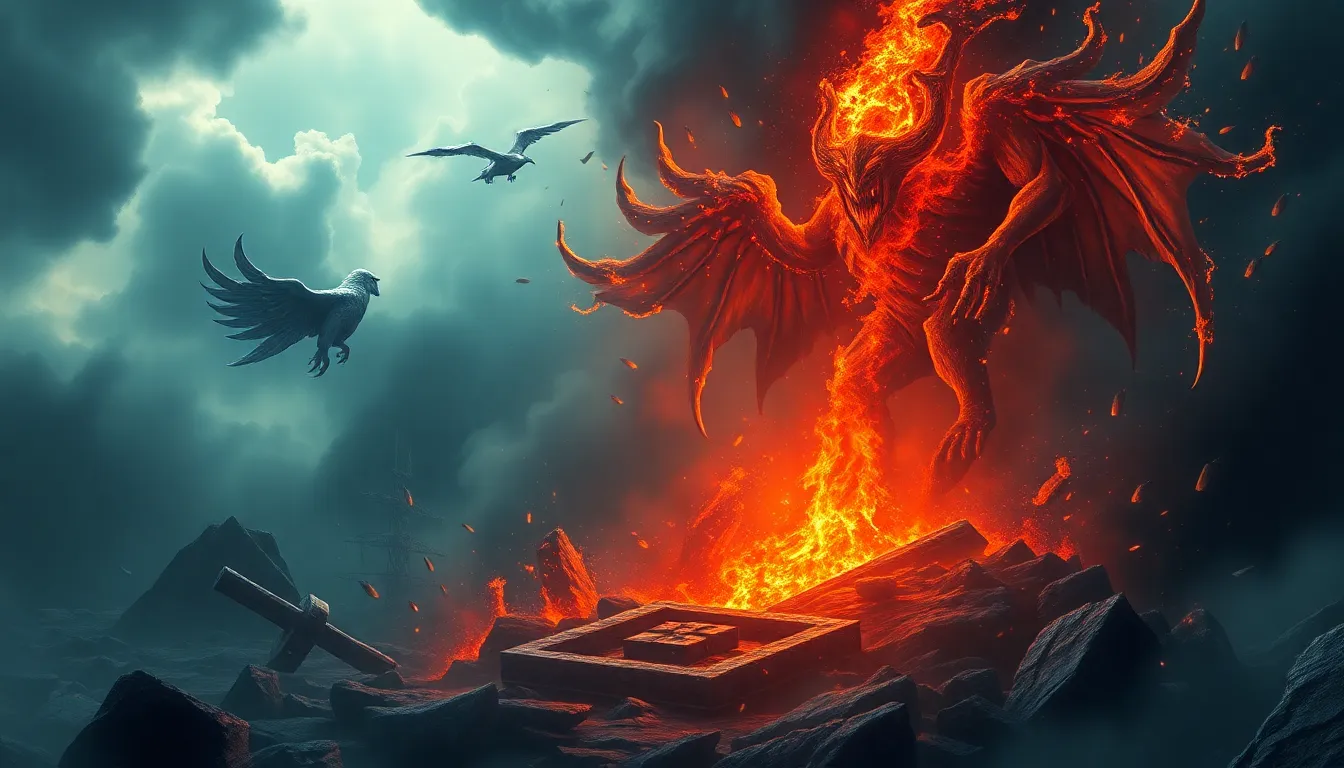The Gods Have Spoken: Unforgettable Stories of Divine Retribution
Introduction: The Concept of Divine Retribution
Divine retribution is a profound concept that suggests a higher power or deity enacts punishment on individuals for their immoral actions. This idea spans across various cultures and religions, often serving as a moral guideline for human behavior. In ancient civilizations, gods were frequently depicted as enforcers of justice, ensuring that the balance between good and evil was maintained.
Historically, divine retribution has played a significant role in shaping societal norms and values. It has provided individuals with a framework for understanding justice, morality, and the consequences of their actions. This article explores unforgettable stories of divine retribution across different cultures, examining myths, biblical narratives, Eastern philosophies, folktales, and modern interpretations.
Ancient Myths: Gods and Their Vengeful Acts
In ancient mythology, gods often acted as agents of retribution, punishing mortals for transgressions against divine laws. These stories served not only to entertain but also to impart moral lessons.
- Zeus and Prometheus: In Greek mythology, Prometheus defied Zeus by stealing fire from the gods to give to humanity. As punishment, Zeus condemned Prometheus to eternal torment, having him bound to a rock where an eagle would eat his liver daily, only for it to regenerate each night.
- Odin and Loki: In Norse mythology, Loki’s betrayal of the gods led to his severe punishment at the hands of Odin. After orchestrating the death of the beloved god Balder, Loki was captured and bound, with venom dripping onto his face as a form of divine retribution.
These tales highlight the moral lessons embedded within them: the importance of respecting the divine order and the dire consequences of defiance.
Biblical Narratives: Divine Justice in Scripture
The Bible contains numerous stories that exemplify divine retribution, illustrating the consequences of human actions in relation to God’s will.
- The Flood (Genesis 6-9): This narrative recounts how humanity’s wickedness prompted God to cleanse the earth through a catastrophic flood. Only Noah and his family were spared, emphasizing the theme of divine justice against rampant immorality.
- Sodom and Gomorrah: The destruction of these cities due to their sinful behavior serves as a powerful story of divine retribution. While some view it as a strict form of justice, others argue it raises questions about mercy and compassion.
Eastern Philosophies: Karma and Cosmic Justice
In Eastern philosophies, particularly Hinduism and Buddhism, the concept of karma serves as a framework for understanding divine retribution and moral behavior. Karma posits that an individual’s actions directly influence their future experiences.
- The Story of King Harishchandra: This tale illustrates the principle of truth and integrity. King Harishchandra, known for his unwavering commitment to truth, faced immense suffering, but ultimately, his righteousness led to divine rewards.
These philosophies reflect a deep understanding of moral behavior, emphasizing that the consequences of one’s actions extend beyond a single lifetime.
Folktales and Legends: Retribution in Popular Culture
Folktales often incorporate themes of divine retribution, showcasing the consequences of human actions and societal norms.
- The Tale of Bluebeard: This French folktale tells the story of a man who marries several women, only to murder them when they disobey him. Eventually, his last wife discovers the truth, leading to Bluebeard’s demise as a direct result of his misdeeds.
- The Scorpion and the Frog: This fable illustrates the idea that inherent nature cannot be changed. The scorpion stings the frog despite their mutual need for survival, showcasing the inevitability of retribution for one’s nature.
These stories highlight the moral lessons that have shaped societal norms throughout history.
Literature and Art: The Representation of Divine Retribution
Classic literature and art have continually explored themes of divine retribution, influencing public perceptions of justice.
- Dante’s “Inferno”: In this epic poem, Dante journeys through the circles of Hell, witnessing the punishments of sinners. Each punishment reflects the nature of the sin committed, emphasizing the idea of divine justice.
Artistic representations, from paintings to sculptures, have also conveyed these themes, illustrating the consequences of moral failures and the quest for justice.
Modern Interpretations: Divine Retribution in Contemporary Media
In contemporary media, the themes of divine retribution continue to resonate, appearing in films and television shows.
- “The Good Place”: This series explores moral philosophy and the afterlife, tackling the concept of justice and the implications of one’s actions in life.
- “American Gods”: This show delves into the clash between old and new deities, featuring elements of retribution as gods confront the consequences of humanity’s actions.
Modern storytelling has evolved to reflect contemporary societal values while still engaging with age-old themes of justice and morality.
Psychological Perspectives: The Appeal of Retributive Justice
Humans are inherently drawn to stories of divine retribution, as they resonate with our innate sense of justice. Psychological theories suggest that these narratives fulfill a desire for moral order and catharsis.
- The appeal lies in the resolution of conflict and the restoration of balance, allowing audiences to process complex emotions surrounding justice and punishment.
Critiques and Controversies: The Ethics of Divine Retribution
Despite the allure of divine retribution, there are critiques regarding its ethical implications. Philosophers and ethicists debate the morality of retribution, questioning whether it promotes a culture of vengeance rather than forgiveness.
- Critics argue that the concept can lead to a dangerous justification for violence and harsh punishment, while proponents believe it serves as a necessary deterrent against wrongdoing.
Understanding the complexities of divine retribution invites deeper reflection on justice, morality, and the human condition.
Conclusion
The stories of divine retribution, whether from ancient myths, religious texts, or contemporary media, continue to captivate our imagination and inform our understanding of justice. These narratives serve as powerful reminders of the moral consequences of our actions, urging us to reflect on our values and the impact of our choices within society.



